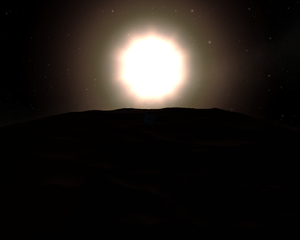Difference between revisions of "Kerbol"
m (→Characteristics: Little edit on this brand new table I've made.) |
m (Made the second image slightly larger.) |
||
| Line 1: | Line 1: | ||
[[Image:Kerbol17.png|thumb|The star Kerbol shines brightly through space.]] | [[Image:Kerbol17.png|thumb|The star Kerbol shines brightly through space.]] | ||
| − | [[File:TinyKerbol.png| | + | [[File:TinyKerbol.png|400px|thumb|A close-in view of Kerbol, minus the solar glow.]] |
[[Kerbol]], also known as '''Kerbin Prime''', '''The Sun''', and '''The Star''' is an [http://en.wikipedia.org/wiki/Stellar_classification#Class_K K class] [http://en.wikipedia.org/wiki/K-type_main-sequence_star main sequence star] [[star]] and parent to the planets [[Moho]], [[Eve]], [[Kerbin]], [[Duna]] and [[Jool]]. | [[Kerbol]], also known as '''Kerbin Prime''', '''The Sun''', and '''The Star''' is an [http://en.wikipedia.org/wiki/Stellar_classification#Class_K K class] [http://en.wikipedia.org/wiki/K-type_main-sequence_star main sequence star] [[star]] and parent to the planets [[Moho]], [[Eve]], [[Kerbin]], [[Duna]] and [[Jool]]. | ||
Revision as of 06:55, 23 September 2012
Kerbol, also known as Kerbin Prime, The Sun, and The Star is an K class main sequence star star and parent to the planets Moho, Eve, Kerbin, Duna and Jool.
Characteristics
| Sun Characteristics | Kerbin's Characteristics | ||||
|---|---|---|---|---|---|
| Equatorial Radius | 65,400 km | 600 km | |||
| Mass | 1.7e28 kg (0.0088 Sols) | 5.29e22 kg | |||
| Density | 14.935 g/cm^3 | 58.467 g/cm^3 | |||
| Surface Gravity | 273.06 m/s² or 27.84 g | 9.81 m/s² or 1 g | |||
| Gravitational parameter | 1.167922e12 m³/s² | 3.5316e12 m³/s² | |||
| Escape velocity Surface | 188.9 km/s | 3.4304 km/s | |||
| Escape velocity Kerbin Orb. | 13.13 km/s | N/A | |||
Reference Frames
| Paid (0.17) | Demo (0.13.3) | |
|---|---|---|
| Warp | Minimum Altitude | |
| 1x | n/a | |
| 2x | 0 m | |
| 5x | ? m (within kill zone?) | ? m |
| 10x | 6,540,000 m | |
| 50x | 13,080,000 m | 16,350,000 m |
| 100x | 26,160,000 m | 32,700,000 m |
| 1000x | 52,320,000 m | 65,400,000 m |
| 10000x | 65,400,000 m | 130,800,000 m |
All Kerbol orbits are in an inertial reference frame. Getting close enough to experience lower maximum time warps results in attacks by the Deep Space Kraken.
Planets
As of version 0.16 there is only a single orbiting planet, Kerbin. With version 0.17 four new planets will be implemented (Moho, Eve, Duna and Jool). Additional planets are planned for future versions.
Trivia
Between versions 0.7 and 0.10.1, Kerbol was a mere point of light in the skybox. It became possible to reach in 0.11, and gained gravity in 0.12. Since 0.14, close encounters will result in a collision that destroys the ship and kills all crew members. It is still safe to drop below the "surface" in 0.13.3, but a ship can break up from the extreme gravity gradients and/or shot outwards at large fractions of c.
The current "surface" of Kerbol is an invisible and likely featureless plateau approximately 4500-4700 km above the nominal radius. There is no known way to land on it, as the Kraken makes all maneuvering difficult, and the gravity reduces the TWR of all engines below 1. One can attempt to place edited parts on the surface, but they bounce erratically at a few hundred to a few thousand m/s if they do not explode.
While Kerbol can be reached from Kerbin's orbit by using a Hohmann transfer orbit, a spacecraft doing so will require a ΔV of about 8 km/s to do so. The most efficient way to reach Kerbol from Kerbin's orbit is to use a Bi-Elliptic transfer. With a sufficiently-distant apoapsis, the required ΔV to sundive can be reduced to under 4km/s, at the expense of drastically-increased flight time.
The name "Kerbol" is created by the forum members, it never appears in the game. In the game the star is referred to as "the Sun"

